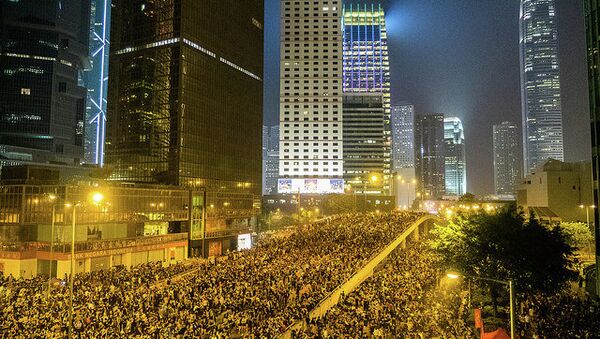MOSCOW, October 22 (RIA Novosti) - The Hong Kong protesters intend to stay in the streets after talks with Chinese authorities ended with no resolution to the conflict, which prolonged economic losses for the mainland and Hong Kong.
As the Hong Kong negotiations collapsed yesterday, prospects for a swift and peaceful resolution of the stalemate have faded. Now, as the Occupy movement plans new street rallies, the conflict has become a major issue for the slowing Chinese economy. The nearly month-long protest is undermining China’s investment attractiveness and contributes to the deterioration of the region’s business environment. If the situation is not resolved soon, shrinking financial opportunities in the city will cause a quicker downturn for the entire Chinese economy.
Hong Kong plays a significant role in Beijing’s strategy of political and economic development, which is evidenced by the fact that Chinese authorities are negotiating with the protesters, while in places like Xinjiang or Tibet any hint of political dissent is crushed by force. This is because of Hong Kong’s economic importance, which is the primary gateway for international finance into China. Beijing does not want to lose a goose laying the golden eggs, but at the same time it does not know how to calm the angered bird. This is why Wall Street is scrutinizing how the city’s protests unfold. “When it comes to Hong Kong, they are trying to communicate, to calm things down as they know that the audience which they are doing so for is not just in Hong Kong, it is beyond. There is a great American interest, they are looking at how this is being seen in Taiwan as they are becoming a lot less confident in the idea of the ‘two systems’“, said Michael Levi of Council on Foreign Relations, as quoted by Bloomberg.
China’s economy is increasingly slowing down, as the third-quarter saw growth shrink to 7.3%, which is the worst in five years. This undermined the government’s target of 7.5% growth in 2014. Mainland China’s slowdown is due to decreasing property investment, fixed-asset investment and retail in July, in August for now . While the Hong Kong events have not yet contributed to this downturn, the city’s unstable political situation is likely to trim the investment inflow into China.
The worst possible consequence of the Hong Kong protests for the Chinese economy is that the political instability may undermine the city’s position as Beijing’s main renminbi offshore hub. The renminbi, or yuan, has traded against foreign currencies with a fixed lowered exchanged rate in order to ensure the competitiveness of Chinese exports. However, as China integrates into the system of international trade, Beijing is experiencing higher pressure for the internationalization of their national currency. At this point, the concern is that this process could be impeded by Hong Kong’s volatility, Barron’s reports. This decrease of capital movement would hurt Hong Kong’s position as a thriving renminbi market. As there is no alternative hub for such activities in China, the political turmoil in Hong Kong, if prolonged, will hurt Chinese foreign trade, which will contribute to a further slowdown of the overall mainland economy.
Moreover, the political instability in one of China’s most economically significant cities may lead to growing distrust by international investors and enterprises towards the Chinese authorities as they may doubt Beijing’s crisis management skills. Coupled with growing workforce expenses and increasing costs associated with the social and political risks, as outlined by Dan Steinbock of Economy Watch, this may ultimately render Chinese industrial production uncompetitive in the eyes of overseas companies.
China’s growth is set to further decline to 7% in 2015. The Hong Kong events will have a significant impact on the mainland economy if prolonged. Since their onset, the protests have had no effect on the economy of the People’s Republic, according to some economists . In the mid-to-long term, however, Hong Kong may "lose its reputation as a trusted gateway for foreign capital to enter China, then it could hurt Chinese firms' access to cheap foreign capital, and potentially hold back ... other financial reforms," said Julian Evans-Pritchard of Capital Economics, as quoted by CNN Money. In this sense, the ‘Hong Kong effect’ might be compared to that of international sanctions currently implemented against some Russian firms and individuals, the consequences of which are to show in the mid-to-long term as well.
Concurrently, recent economic indicators in Hong Kong have shown that the city’s markets and trades are far from collapse. Markets see the recent failure of the negotiations between protesters and authorities as hurting Beijing’s interests, not Hong Kong’s. The city’s stock market has today regained some of the ground previously lost due to instability, while mainland China’s indicators in Shanghai and Shenzhen dropped, Business Recorder reports. Nevertheless, the protests have not disrupted Hong Kong’s economy, as reported by Quartz. Tourism levels in Hong Kong only increased during the last month of protests, as opposed to earlier expectations. The retail sector has experienced a 15-50% drop in sales in early October, however, the current data are mixed and there is no decisive evidence that this industry is experiencing massive losses. “At least for now, fears that they (the protests) are crushing the city’s economy seem overblown”, Quartz concludes.
Therefore, the mainland economy is likely to suffer greater losses caused by the ongoing Hong Kong crisis. Beijing is experiencing a hit to its public management reputation and international trust, facing new threats to its wider economic strategy, while Hong Kong may withstand the protests with only minimal losses to its non-financial sector. However, in the medium term, the Occupy movement will start to wear down Hong Kong’s appeal as Asia’s largest financial center, and it may well fade away to become an ordinary city within the People’s Republic.


